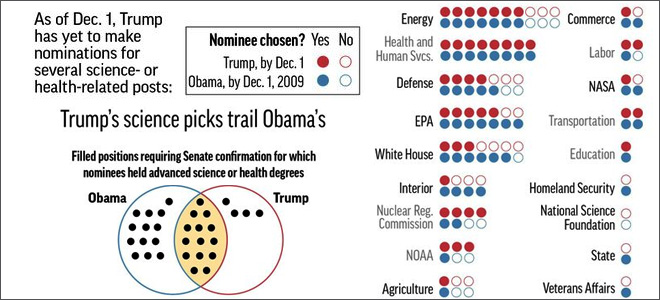
Associated Press
December 5, 2017
by Seth Borenstein
When it comes to filling jobs dealing with complex science, environment and health issues, the Trump administration is nominating people with fewer science academic credentials than their Obama predecessors. And it’s moving slower as well.
Of 43 Trump administration nominees in science-related positions — including two for Health and Human Services secretary — almost 60 percent did not have a master’s degree or a doctorate in a science or health field, according to an Associated Press analysis. For their immediate predecessors in the Obama administration, it was almost the opposite: more than 60 percent had advanced science degrees.
The AP analyzed 65 Senate-confirmable positions that deal with science and environment, many of which haven’t been filled yet after 10 months. The analysis focused on earned degrees, not life experience.
“This is just reflective of the disdain that the administration has shown for science,” said Christie Todd Whitman, a former Republican New Jersey governor and Environmental Protection Agency chief.
“When you’re talking about science, issues about protecting human health…it’s very, very complicated and sophisticated work,” said Whitman, who was appointed by George W. Bush and does not have an advanced degree herself but surrounded herself with people who did. “You need the background and experience to handle these things.”
Including now-resigned Health and Human Services Secretary Tom Price, a medical doctor, the number of political appointees with a doctorate in science or a medical degree dropped 21 percent from Obama’s 19 to Trump’s 15 in those equivalent positions. And when it comes to master’s degrees, the number decreased one-third from 27 in Obama to 18 in Trump.
Public health researcher Dr. Caroline Weinberg, who helped organize last spring’s protest March for Science, said in an email, “I knew the dire straits we were in but seeing it laid out with percentages really amplifies the horror.”
Trump administration officials did not respond to repeated requests for comment.
It is especially noticeable in the Energy Department, which oversees the nation’s nuclear stockpile.
None of the seven Trump energy science-oriented nominees — including the undersecretary for science, who did research while in the U.S. Navy — has even a master’s degree in a science field, although some are lawyers and have MBAs. Five of their Obama predecessor’s had master’s degrees in science field and four had science doctorates — not including the Obama deputy Energy secretary, who had a doctorate in international relations. The two Obama Energy secretaries both had doctorates in physics, and Steven Chu was a Nobel prize winner in physics. Trump Energy Secretary Rick Perry has a bachelor’s degree in animal science and was a former governor.
“This is just hollowing out of expertise in these posts,” said Max Boykoff, director of Center for Science and Technology Policy Research at the University of Colorado. “It’s a really worrisome trend.”
This isn’t about making jobs for science, but providing the best advice for government leaders who have to make tough decisions, said Rush Holt, CEO of the American Association for the Advancement of Science, the world’s largest general scientific society.
“It’s the policy-makers themselves who need it. If they want to develop policies that are most likely to succeed, they should make those policies with the understanding available of how things are,” said Holt, a former physicist and Democratic congressman from New Jersey. “We do this with the age-old, time-tested procedure of determining how things are. We call that science.” Read more …

